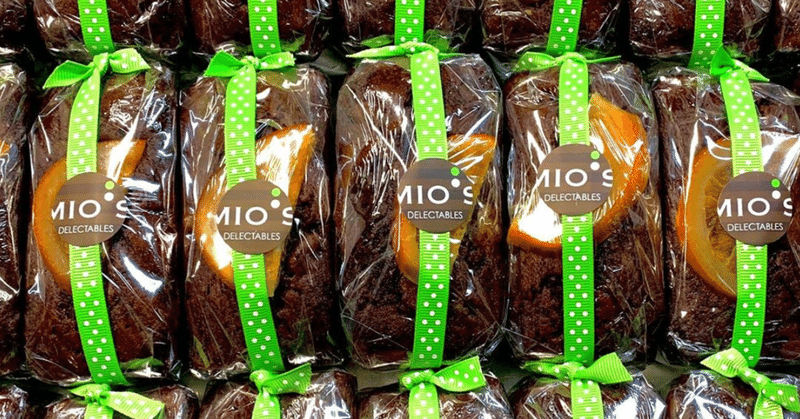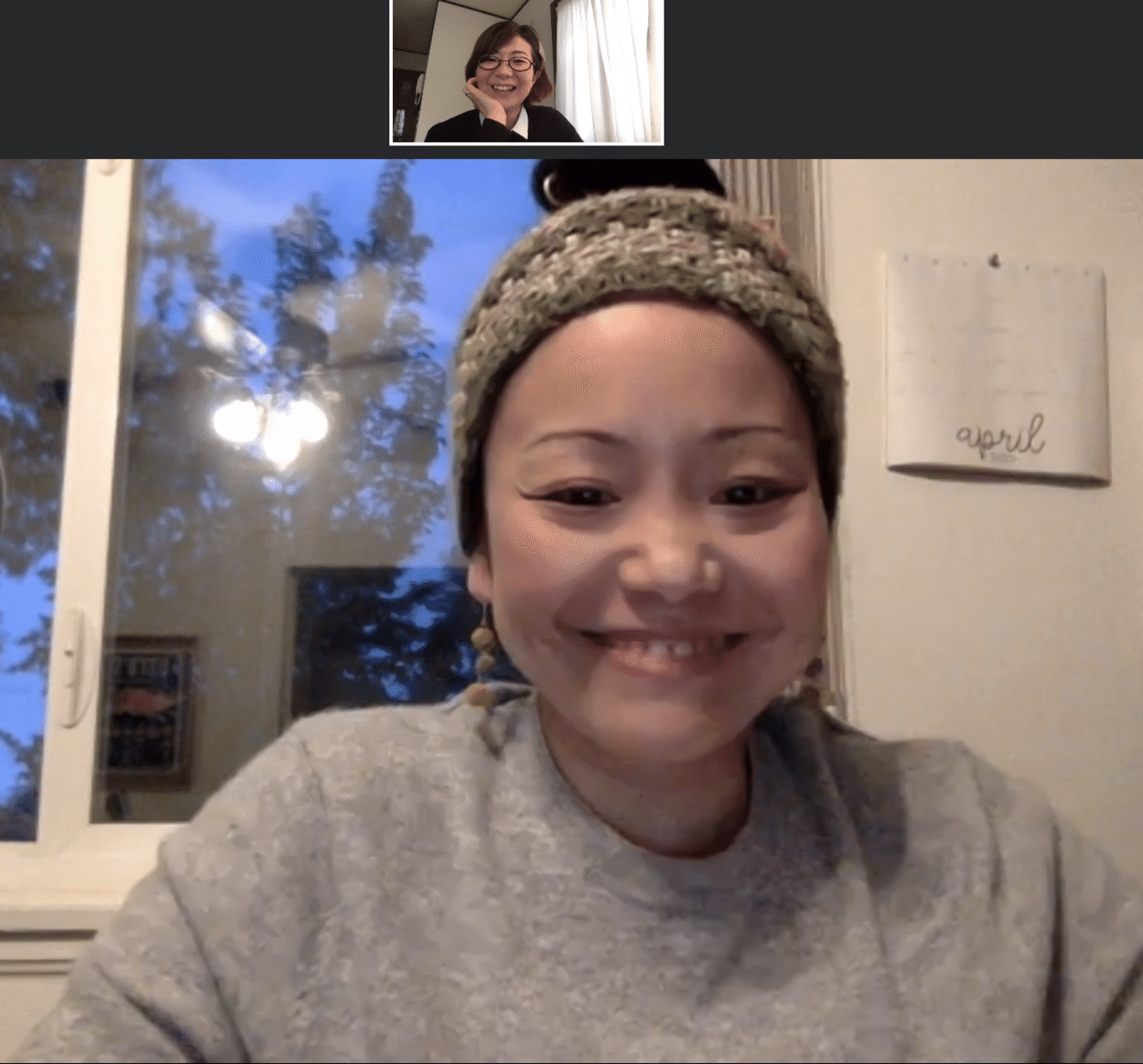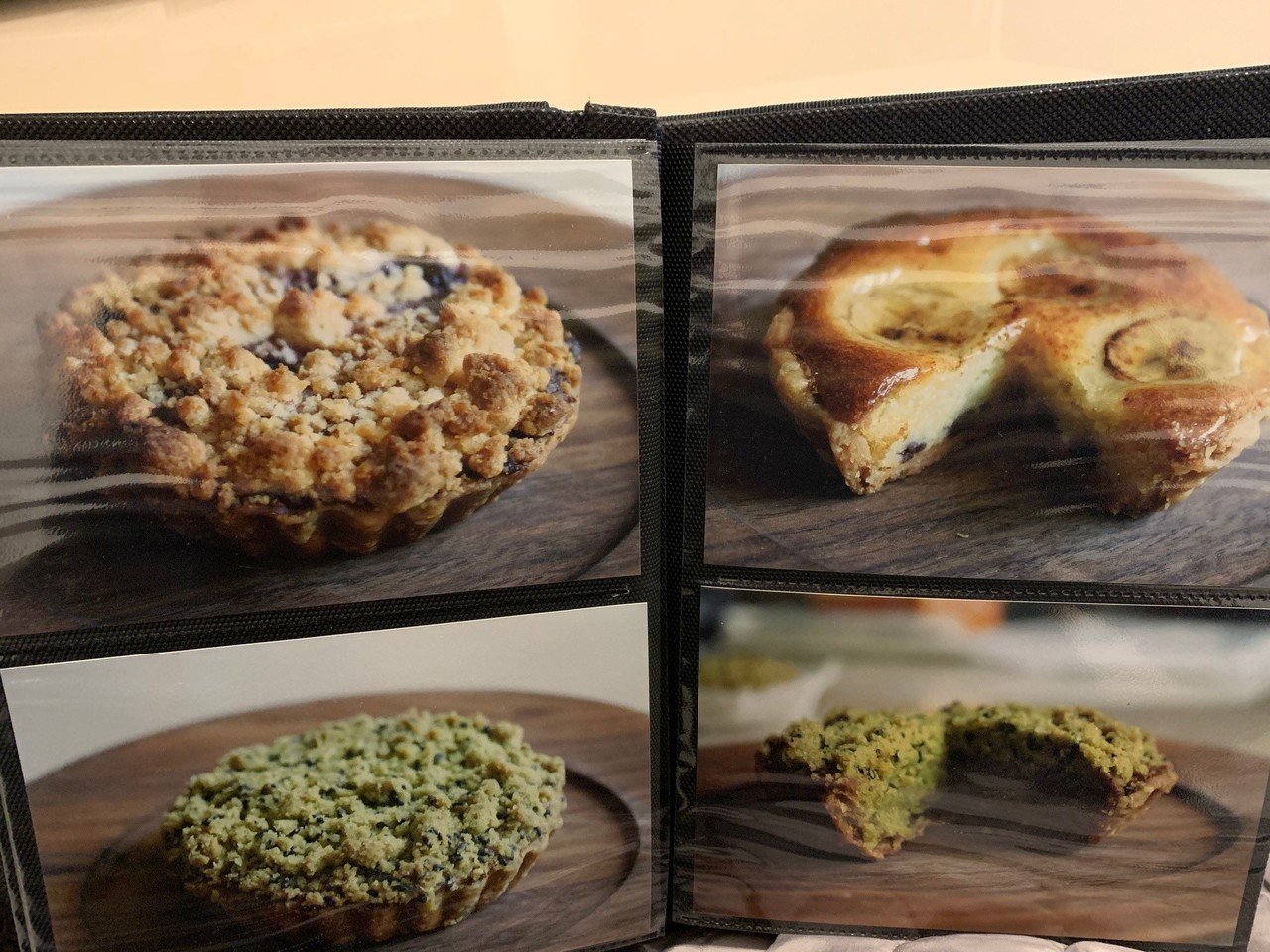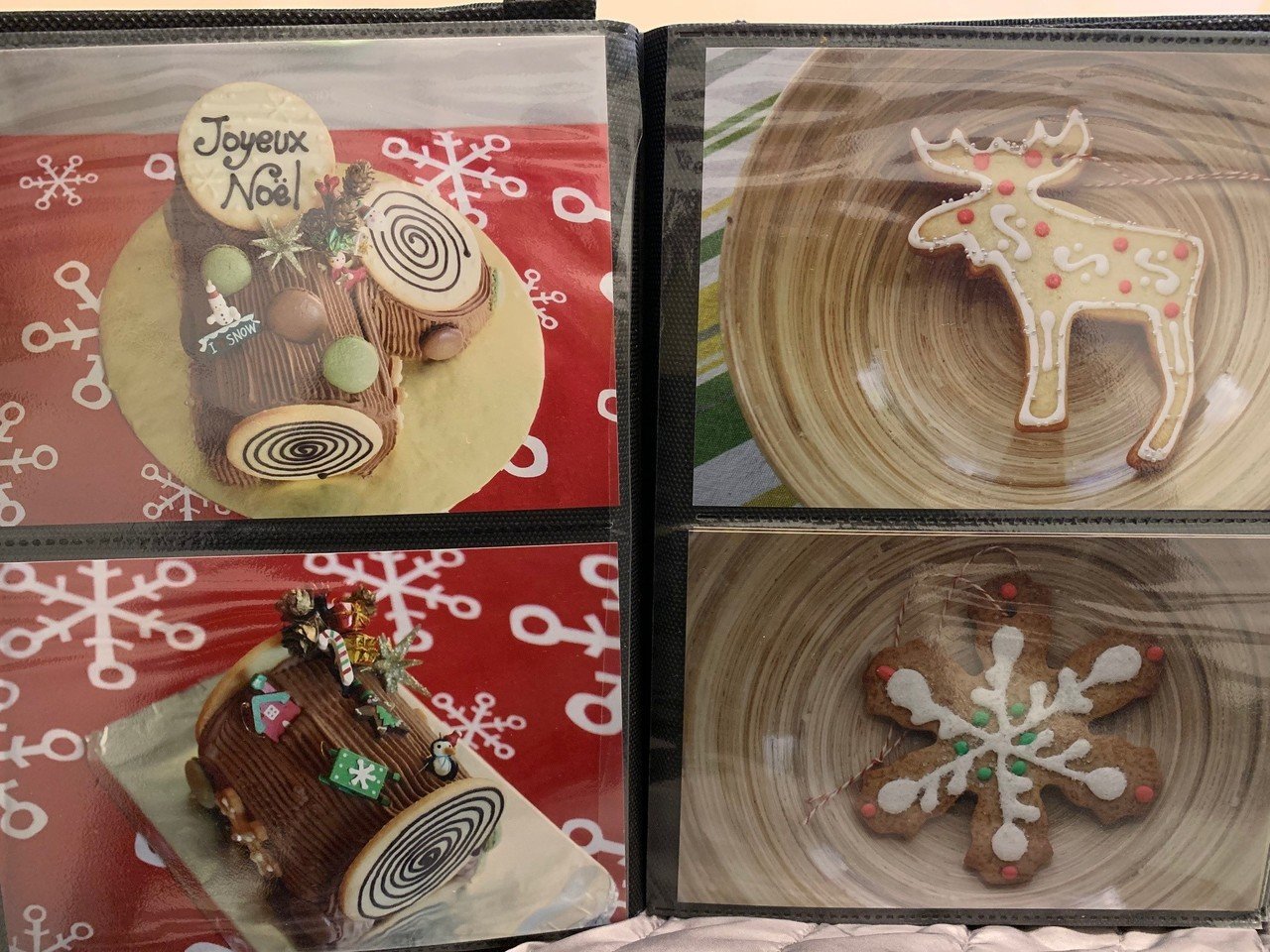
Chat with Mio, patissier, business owner, Portland, OR
by Ryoko Kawahara
Translated by Mami Raske
In Tokyo, the all-too-familiar “Stay Home” life continues because of COVID-19. I myself have not been to my office in the heart of Tokyo for over a month, and settled into the life of online meetings at home every day. In the midst of all of this, I realized that I can talk to anyone local or abroad, have a heart-to-heart and connect with each other as long as online tools are available. It’s not all that different talking with my colleague in Shinagawa or a friend in Beijing.
If that’s the case . . . someone popped up in my mind - Mio Asaka in Portland, Oregon, USA. She’s an old friend of mine and currently a patissier. When we met, she was a graphic designer. She’s been living in the US for over a decade. Now, she’s firmly rooted in Portland, and I had learned via SNS that her sweets are adored by the locals.
I’ve always believed in “interviews on site” but ‘tis the present life, I contacted her via Zoom to interview her and to see how she’s doing. We’ve occasionally messaged each other, but it’s been 20 years since we saw each other. I asked her about how her current life and work are going, how it is to own a business away from home, and such. (Interviewed on April 26, 2020)
Table of Contents:
In the Midst of COVID-19, There is Someone Waiting for My Sweets
Entering the World of Food through the Love of Chez Panisse
Must Be Your Own Boss to Have Creative Freedom in the US
Realization that Not Everyone Accepts Me

Mio Asaka: Mio majored in piano at a university, found a job in music business post-graduation, and decided to become a graphic designer. She then studied abroad in England to learn English, and eventually got into the food business. She worked at a restaurant while taking classes at a patissier school. She started living in the US in 2004, and lives in Portland, OR. She’s the owner of Mio’s Delectables. Her trademark is the hairband her friends knit for her.
In the Midst of COVID-19, There is Someone Waiting for My Sweets
————Long time no see! First, please tell me about your store.
Long time no see. Every Saturday, I have Mio’s Delectables store at the Portland Farmers Market located at Portland State University. This market is a close-knit local community and features local agricultural products and other local goods. My store has been a participant since 2014.
▲ Mio's Delectables at PSU Farmers Market ( May, 2020 )
————Has the city changed since the novel coronavirus started going around?
The city is empty as everyone is staying home. When I’m out, I hardly ever see people talking to each other. At grocery stores, there is a limit on how many people can go into the store, so you have to wait in line outside. Shopping has become an uninteresting experience. This is such a stark contrast to normally very friendly Americans, but this is the new way to be considerate to others around you.
Japan closed schools earlier, didn’t they. At first, my American friends thought closing schools was an overreaction, and even laughed at it incredulously. But everything changed after the emergency declaration - everyone’s mentality and behavior completely shifted. It felt symbolic of the either-or American attitude.
————How has it affected your business?
My store is only open one day a week at the market, so my beloved regulars would check my instagram and still visit my store. At-risk customers like the elderly would come right at 8:30am when the market opens. They want to make their purchase before the crowd arrives. I also started accepting US only online orders. I was worried as I had no idea how many people would order, if anyone at all, but it’s going fairly well. Maybe at times like this, it’s especially important to be able to enjoy a little bit of sweetness.
When I look around, restaurants are closed and empty, but the food delivery business is thriving. People in this country have been used to delivery service, so online businesses seem to be doing well.
▲ Mio’s Delectables started accepting online orders. Shipping within the US only.
Entering the World of Food through the Love of Chez Panisse
————Why did you think to work in the US?
When I was working as a designer at Jingumae, there were great places like Kinokuniya supermarket where quality breads were available, and I often got on a company bicycle to hunt for great breads during lunch time. As if to foreshadow my path, my colleagues saw how I loved bread and teased me “Maybe you should work in the food industry?”
Around 2000, I learned of Chez Panisse in Berkeley, CA, and its local movement. I wanted to see it with my own eyes and experience it, so I visited there. During the trip, my gut told me “This is the world I’ve been searching for.” At the same time, my interest in Europe was stronger then, so I studied English in England. I also learned baking at a community college. After that, I went to patisserie night school while working at a restaurant in Tokyo. Luckly, I was able to obtain US permanent residency via the lottery program, and came to live here.
I lived in Florida at first where my sister was. I hoped to work as a boulangerie but got a job as a patissier at a few stores. I had always wanted to move to the west coast, but as you know the cost of living in San Francisco and the Bay Area was prohibitive. I spent seven years in Florida, and felt like I was going to give up. Then, a friend told me about Portland, OR, and I came to visit almost immediately. It was reminiscent of Berkeley where Chez Panisse is, and I decided to move here.


▲ A portfolio she carried to get a job at bakeries. Looking back, these were “not quite there yet” but she was never turned down as long as she could get to an in-person interview.
Must Be Your Own Boss to Have Creative Freedom in the US
————Were you able to run your business in Portland quickly?
It was my dream to run my own business in Portland, so I worked at a bakery near the house I moved into to learn how it’s like to live here and to access ingredients. Originally, I was aiming to become a boulangerie, but by this time I had changed my mind to become a patissier. I’ve worked at various places, and there was never an opening to make bread. A tart by a wonderful person, my mentor, also influenced my decision, and I had naturally started to make sweets before I knew it.
At the bakery near my house, I was the sweets person from the early morning. I was extremely busy, but was able to come home in the afternoon. While working, I started preparing to become independent, and it took me three years to open my own store at the Portland Farmers Market.
————Why did you focus on running your own business?
There was something very different about the Japanese and American stores I’ve worked at. In the US, the owner’s style is more important than anyone else’s. In Japan, I worked in an environment where my sweets and my design ideas and suggestions were accepted without much pushback. But in the US, if I changed anything even a little bit, the manager would come over and tell me “That’s not how we do things here.” Of course not all stores in the US are like that, but it’s very important to maintain and preserve the store’s image. On the flip side, that’s the source of each store’s strong individuality. I started to think, regardless of profits I wanted to make my own sweets that only I can make and wanted to run a store where I can keep challenging myself.
————But it must be hard running your own business and bake sweets?
My store is only open once a week, but I work every day. For example, I bake things that can last for a while like meringue products earlier in the week, I then put products into individual bags, and prepare doughs and batters to bake. On Friday, I bake the rest of the sweets. There's plenty of work other than making sweets, such as posting on SNS, dealing with online orders, and shipping the products. Even with the support staff, I’m busier than the time I was working my hardest as a designer in Japan. But it’s all for the love of my work and my customers, so I don’t mind it at all.
I’ve worked at various places, and feel that everything I’ve experienced has come together at this point in my life. When I was a designer, the office (Makoto Saito Design) dealt with large scale projects, so I learned how to manage busy schedules and how to think on my feet in a fast-paced, demanding environment. These experiences culminated to make running my business possible.
Realization that Not Everyone Accepts Me
————What are your customers like? What are the popular sweets?
Right now, about 80% my customers are Americans. Mio’s Delectables sell products that I feel like making at the time, using seasonal fruits and other ingredients that are available then. Many customers check my instagram and visit my store to ask for what they saw. There are a lot of elderly customers, and they often ask “What’s today’s special?” It makes me so happy to see them enjoy my sweets like that’s the highlight of their day.
What I’d like to focus on now is pies. Once a year, there’s a pie that I make for the American Independence Day celebration, and that is very popular. This year, the National Pie Day (3/14) fell on Saturday, and the customers flocked to several kinds of pies I sold that day. I think pies are an American soul food. My style has always been to make what I love to make, but I’d also like to be mindful of incorporating customers’ preferences into my arrangements.
▲Banana Custard Cream with Irish Country Cream
————Have there been any experiences that resonated with you during your career as a patissier?
I attended a potluck party for my child’s class, and no American guests, parents or children, chose to eat what I brought. The few people who ate it were Japanese people. The reason American people didn’t eat it was because “I’ve never had it.” On the other hand, sweets that were popular at the party were things that were very familiar in American culture, like simple chocolate chip cookies. On some fundamental level, many Americans are conservative in their food choices. At the market, my sweets sell very well, but that’s not the whole story. My sweets don’t necessarily appeal to all Americans. That’s not a reason to change my philosophy drastically, but it was a good learning experience, as my patissier life is here in the US.
————What are your challenges from here on?
I’m not usually the most outgoing person. But now I have a store at the farmers market. The joy of interacting with my customers is something I wouldn’t have experienced were it not for this work. The challenge now is, how to maintain the current work.
Post-Interview
Mio says she isn’t the most outgoing person, but of all the people I’ve met she’s by far the most intuitively action-based person when it comes to things she sets out to do. She played piano since she was little and continued onto the university level. From a graphic designer to a patissier. From Japan to abroad. She makes her dreams come true, and not everyone can possess such energy. If there’s a lesson here, it’s that she does what she loves. When you do what you love, work no matter how hard is never too hard. It’s truly a struggle to continue doing what you don’t want to do, isn’t it.
It was fun to chat with her on the side too, and there were several topics that caught my attention regarding living in Portland, OR. Around 2015, Japanese media often featured Portland, but regardless of such a fleeting trend Portland continues to be Portland. Chatting with Mio renewed my interest in visiting there someday.
Portland Uniqueness
✔️At grocery stores in Portland, foods locally grown have “local” stickers. Portlanders collectively want to choose local products to support the local economy.
✔️When a chain store is proposed, many Portlanders fervently oppose it. Stores owned and run by individuals are abundant. But it’s also true that outside the city center, fast food stores are often seen.
✔️It’s rather rare to meet someone who actually grew up in Portland. Many people migrate here because they buy into what the city stands for.
✔️Each state can have very different laws (an interesting article by ELLE). In Florida, it’s not allowed to sell food made in a residential kitchen, but in Oregon it’s fine to do so as long as you get a license. But there are strict inspections such as to make sure there are no pets.

Mio’s Delectables
Portland Farmers Market
Time: Every Saturday 9:00am-2:00pm (November through March), 8:30am-2:00pm (April through October)
Location: Portland State University, Portland, OR
www.portlandfarmersmarket.org/our-markets/psu
この記事が気に入ったらサポートをしてみませんか?
